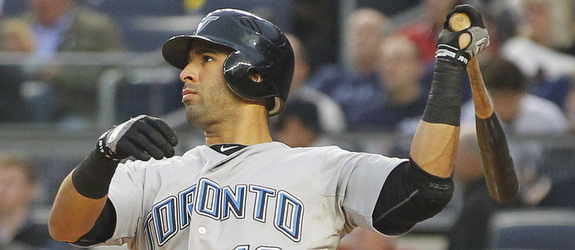
I try not to evaluate things in hindsight all that often here, just because it’s easy to sound smart when you already know what happened. That said, let’s have a little fun and play a game of “what if” with last night’s intentional walk. No, not the one to Juan Rivera (which made little to no sense), but the one to Jose Bautista earlier in the inning.
The game was tied at one when Corey Patterson led off the sixth inning with a double over the head of Chris Dickerson. Baseball Prospectus’ run expectancy matrix tells us that a team with a runner on second an no outs is expected to score 1.035 runs in the inning. Let’s say the Yankees pitched to Bautista and he did hit a homerun in that spot, making it a 3-1 game. He just added two runs to the ledger, but they were already expected to score 1.035 runs in the inning anyway. The net gain from the homer would have been 0.965 runs (2 – 1.035). The inning then “restarts” with the bases out and no one out, which has a run expectancy 0.4646. The total impact of the homer would have been 0.965 runs plus the 0.4646 runs, or 1.4296.
The Yankees didn’t pitch to Bautista though, they put him on first base intentionally. The run expectancy of first and second with no outs is 1.3986, so the impact of the free pass was just over a third of a run (0.3636 to be exact). That’s the situation they chose over pitching to Bautista, which in the worst case scenario (homer) would have resulted in an additional 1.4296 runs above expected. Of course Bautista wasn’t guaranteed to go deep (even if it felt like he was), the guy had “just” 19 long balls in 178 plate appearances coming into that at-bat, so the odds of him hitting one out were 10.6% based on how his season had played out to that point.
If we crudely multiply that 1.4296 worst case run expectancy by the chances of it happening, or 10.6%, we get a 0.1515 runs. That’s less than the 0.3636 runs the Yankees gave the Blue Jays by putting Bautista on, so yeah, the math says they should have pitched to him. Of course it didn’t play out according to the run expectancy, Toronto ended up pushing five runs across in the inning, making those totals of 0.1515 runs and 0.3636 runs seem silly. Remember run expectancy doesn’t tell us what will happen, just what is expected to happen based on historical data. In hindsight, pitching to Bautista and hoping he didn’t hit a homer was a better option than walking him, but that’s much easier to say now than it was last night.
Leave a Reply
You must be logged in to post a comment.